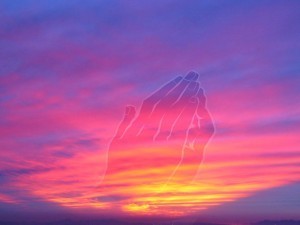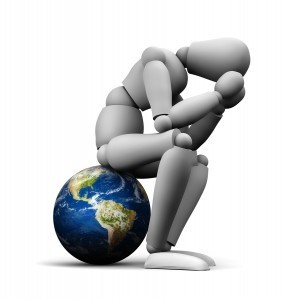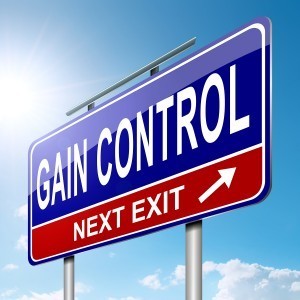Lin Wilder's Blog, page 60
December 4, 2014
Communion in Diversity
Communion in diversity, legitimate diversity, is the phrase Pope Francis used in the Joint Declaration created by Pope Francis and Ecumenical Patriarch Athenagoras at their joint meeting in Jerusalem last week, to describe the “unity to which only the Holy Spirit can lead us, that of communion in legitimate diversity,” reminiscent of John’s Gospel:
That they may all be one;
As you, Father , are in me, and I in you,
That they also may be one in us
Had we been home, where daily Mass is a three hour endeavor, I’d not have noticed this rather extraordinarily clever phrase which begs for thoughtful reflection; but here, near San Luis Obispo, where there are three Catholic churches and a Benedictine Monastery within a 20 minute drive, I heard the priest use it yesterday at the daily Mass of the Benedictine Monastery. There are several reasons these words of Pope Francis are so salient and ring so loudly in my mind and heart:
We attended a Greek Orthodox Sunday Mass by mistake on the Feast of Christ the King a couple of Sundays ago and then a few days later attended a daily Mass at the Catholic Byzantine Church, our original destination.
We’re not home: Advent seems to fit the dual place of being at home but not really home.
The attributes of Advent: patience, thoughtful reflection, expectancy and being awake are qualities, probably virtues, that need strengthening in me.
Despite the fact that the Garmin was set to the correct address for St. Anne’s Byzantine Catholic Church in San Luis Obispo, it could not distinguish St. Andrew’s Byzantine Church from St Anne’s since the two churches sit side by side. Exiting the car, we met some people heading in and asked if this was the Byzantine Church, received an affirmative and very welcoming reply and walked into what we figured out was a Greek Orthodox Church, therefore not in communion with the Roman Catholic rites.
The church, the icons and the chants were some of the most beautiful we had ever witnessed; their practice of saying the “Our Father” in multiple languages; Greek, Serbian, Croation, and Russian are only a few that I can recall, brought back memories of Medjugorje stopping at each Station of the Cross on Cross Hill, each station said in one of the 8 languages represented in our group.
A few days later, when we attended the ‘approved’ liturgy of the Catholic Byzantine rite, the similarities between the two astonished me. Such a unique perspective I had, one where I could focus only on the similarities, since I knew too few of the details which would reveal the differences between the two Byzantine liturgies, revealed clearly, for just a moment, the source of the endless squabbling about differences that are fundamentally trivial.
Christmas will be very different this year; we’ll not be home, as we are trying out life here on the central coast of California, therefore I’m not sending out Christmas cards and won’t be home to receive those you send, if you do send them. But that in way diminishes my thoughts and prayers for each of you, regardless of whether we know one only on-line or for most of our lifetimes. I began to formulate this post over a week ago when we were approaching Advent.
Being here, in the RV seems to demand a more relaxed countenance than does being at home. Despite the facts that John and are still working our portable business lives while away, our work has developed a different pace; daily Mass has once again become a routine, one which does not require entire mornings and we seem to be just as productive at our work but are working fewer hours, taking time to see plays and go to movies, things that we simply don’t take the time to do when at home.
Ever since I learned about Advent, I have loved this season and the woman standing at the center of it: Mary, who waits with expectation, filled with a physical and spiritual Wisdom that defies all words, all languages, her silence filling this noisy and fearful world.
There is a longing in our hearts, O Lord,
for you to reveal yourself to us.
There is a longing in our hearts
for love we only find in you, our God.
1. For justice, for freedom,
for mercy: hear our prayer.
In sorrow, in grief:
be near, hear our prayer, O God.
2. For wisdom, for courage,
for comfort: hear our prayer.
In weakness, in fear:
be near, hear our prayer, O God.
3. For healing, for wholeness,
for new life: hear our prayer.
In sickness, in death:
be near, hear our prayer, O God.
4. Lord save us, take pity,
light in our darkness.
We call you, we wait:
be near, hear our prayer, O God.
The post Communion in Diversity appeared first on Life In The High Desert.
December 1, 2014
Your Dog the Genius
Since it was close to ten when we arrived at Avila Beach this morning, John and Shadow waited graciously while I went to Joe Momma’s to get my Latte; then we walked a half to three quarters of a mile or so down to San Luis Pier where dogs can race around sans leash all day. I’d been talking to Shadow all morning about the fact that we were going to take him to the beach but since the line at Joe Momma’s coffee house was twenty minutes long, I figured that he’d begun to think that I’d promised him something I could not deliver…again.
When we got to San Luis pier and I took his leash off, Shadow stood, looked around, then slowly, cautiously, walked down the concrete boat ramp to the beach, then he stopped, turned back to look at me clearly asking, “Are you going to call me back?” When I did nothing but grin at him, he started to trot down to the beach, then run, first to the people, then to their dogs.
As I caught up to Shadow, the people and their dogs, I first said hi to their dog, as is my habit, then to the person, to ask them about their dog. What kind is she or he if not immediately obvious, grinning at the dog and at the people and at Shadow. And I realized that this type of casual conversation, I am really good at: talking about dogs, their dog, where they found them, if a rescue, what rescue center, as many details as they care to offer. I have an agenda these days-I’m hoping we can find another dog but as I think about why walking on a beach watching people play with their dogs is so much fun for me, I realize for the billionth time that dogs teach us happiness. They are the gurus, the experts on happiness.
Recently, I’ve discovered a delightful blog called, Coffee with A Canine and a book called The Genius of Dogs which is advertised on Marshal’s site. A title like that was, of course, irresistible to me, so I bought it and downloaded onto my Kindle. Authors Brian Hare and Vanessa Woods claim that dogs are the most successful mammals on the planet next to us. Canine research has uncovered an average ‘vocabulary’ for dogs of somewhere between 100 to 500 words understood between dogs and us.But recently, research is centering on the almost unbelievable ability of dogs to interpret accurately the behavior of humans. Hare and Woods turn the research around in an intriguing claim that their intelligence improved after the fact.
After what fact?
After they used their innate friendliness, interest in humans-their genius- developed as a consequence to their friendliness. Shadow is the friendliest dog on the planet-ergo a genius.
The post Your Dog the Genius appeared first on Life In The High Desert.
November 28, 2014
The Affluent and Homeless On Thanksgiving Day
This is the land of beautiful people, perfect weather and stunning coastlines but in the marginal areas along the back, rarely traveled dirt paths to the stunning dunes of Oceano beach are the homeless: Skinny, filthy and hollering loudly at the rising sun, the guy was either stoned or psychotic, or both. And I sped up my pace, not at all sure what the guy was capable of in the cool dawn of this Thanksgiving morning; quietly, I urged the dog to move more quickly.
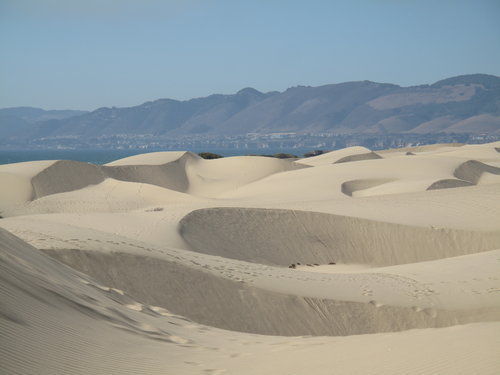
On the corners of the gleaming grocery stores, offering everything from kale shakes to premium grass fed beef, sit the men and women, holding signs like “Please help” or “Anything will help, God bless.” hoping that we’ll roll down the window and give them something, anything.
Last Veterans Day, I happened to listen to a newscaster discussing John Kerry’s address and the promise he made on behalf of the Obama administration to ‘wipe out homelessness among Veterans’ and assure that every Veteran has a roof over his or her head with plenty of food.
At the very least, it is disconcerting to see these men and women on street corners sometimes with dogs holding their various signs; at the most, our thoughts merge with the statement of the Secretary of State, John Kerry and we feel sorrow, guilt, even anger at this seemingly simple problem: Our response, like Kerry is to give money, thinking we are helping, providing them with a meal.
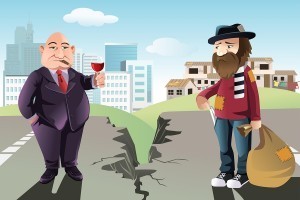
I have learned through the years of working with different shelters, talking with some of the homeless men and women encountered at the various programs we have been acquainted with, that the ‘homeless’ are comprised of a variety of men and women who range from having suffered a run of bad luck to addicts and the mentally ill.
The men and women who have a streak of bad luck seem somehow to pick themselves up and return to work. But the addicts and the mentally ill confound this awful problem in ways that cannot be more complex.
The homeless problem was exacerbated with the decision of Jack Kennedy to insinuate the Federal government into the institutionalized populations of the mentally ill. Many thousands of chronic, mentally ill patients were discharged from the institutions which had been serving as guardians, most with nowhere to go; almost overnight, the cities of this country were handed a labyrinthine problem. With the best of intentions the Federal decision that ‘freeing’ these folks was more humane than was locking them up, thousands-perhaps hundreds of thousands hit the city streets and remain there.
Are they better off sleeping on patches of sand here along these coastal paths, far better, to be sure, than the concrete of a city street or ‘safe’ and chemically anesthetized in institutions?
Many of the homeless veterans Kerry spoke of have such serious PTSD along with other psychological problems that drugs and alcohol are their favored treatment. Reasonably, homeless centers cannot shelter people incapable of maintaining sobriety.
Giving more money to fix this? If only the solutions were that simple.
We continue to drive by the signs, ‘Work for Food’, ‘Please help’ signs held by these people, wondering whether the five dollars we give them goes to food or drugs, wondering what their story is; wondering how they will spend Thanksgiving. And sometimes, I roll down the window and hand him the money.
The post The Affluent and Homeless On Thanksgiving Day appeared first on Life In The High Desert.
November 27, 2014
Gratitude: Is It A Virtue?
Photo-http://www.owlsandorchids.com
There are times that it feels as would, I imagine, a tsunami: Caught up with such power, force and hugeness that I feel walloped, almost annihilated, flattened by the sense of gratitude. Attending Mass yesterday at the Benedictine Monastery of the Risen Christ was like that. We had been discussing when we could get to the daily 11am Mass that is celebrated daily by this very small community of Benedictine monks we discovered in San Luis Obispo and yesterday worked perfectly.
The chapel lacks ostentation similarly to the many other Benedictine Abbeys we have joined in celebration of Mass; but the architecture of these Abbeys varies widely, from the simple, wooden, white clapboard structures of St. Benedict’s Abbey in Still Water Massachusetts, to the impressive organ in the choir of Mt Angel Seminary and Abbey in Salem Oregon,
to the impressive organ in the choir of Mt Angel Seminary and Abbey in Salem Oregon, 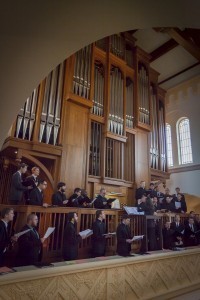
to a small, simple glass enclosed chapel of The Monastery of the Risen Christ overlooking the rolling hills of San Luis Obispo, California, that wave of gratitude begins to climb, carrying me with it each and every time for this is where I belong; these strangers whom I have never met, are my family.
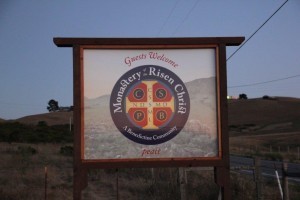 Just like every emotion, this makes no sense at all for how can one feel that these strangers are family when never having met them, seen them, even known of their existence until suddenly we do know and we visit and we know, recognize this as home, this place we have never seen before?
Just like every emotion, this makes no sense at all for how can one feel that these strangers are family when never having met them, seen them, even known of their existence until suddenly we do know and we visit and we know, recognize this as home, this place we have never seen before?
And so today in thinking about gratitude, I have wondered if perhaps it is not an emotion at all; if it may be a virtue. Gratitude is not listed among the virtues of our faith- we are taught of the Cardinal virtues of prudence, justice, fortitude and temperance and of the theological virtues of hope, faith and charity. Gratitude is unlisted among them.
But here is how the Catholic Catechism defines human virtue:
Human virtues are firm attitudes, stable dispositions, habitual perfections of intellect and will that govern our actions, order our passions, and guide our conduct according to reason and faith. They make possible ease, self-mastery, and joy in leading a morally good life. The virtuous man is he who freely practices the good.
If then, gratitude is in fact a virtue, it explains the tsunami of sensibility that defies mere adjectives like thanks, joy and happiness that descends on me at these times…and other unexpected times as well, the sudden appearance of something unexpected, something beautiful, to which the only possible response is wordless awe at such mystery and majesty.
The post Gratitude: Is It A Virtue? appeared first on Life In The High Desert.
November 26, 2014
Going Camping
I remember when camping meant a tent, sleeping bags, listening to the raccoons nimbly flip off the top of the metal garbage container and nights where the stars were so dense and the milky way created such a wide swath through the sky that most of the black night is obscured.
That was camping.
For close to six weeks now,we’ve been living in an RV resort with huge rigs like ours, three to four slide-outs so that the mammoth bus can fit on the road while traveling, then expand about 30-40 per cent to somewhere between 400 to 500 square feet. Most rigs are similar to ours with accouterments like gas fireplaces, 2 televisions, queen sized bed, full bathroom, leather couches, complete kitchen for preparation of meals, all done in a very tasteful decor.
Many of the rigs have license plates or signs about ‘goin camping.’ The password to our internet service is ‘gone camping’.
In these central California November days, the days are shortening quickly; therefore by 5 in the afternoon, it’s getting dark, by 6 or thereabouts, we see the campfires begin to appear until a fire can be seen in about 30% of the ‘campsites.’ We see families and friends sitting in their canvas chairs, with jackets, sweatshirts because when the sun sets this ocean air cools quickly. I can imagine what is happening around each of the fires as the flames illuminate the faces of men, women and children engrossed by that primal need to belong to the tribe and the tribal tradition of telling stories, sharing food and drink in an ancient and mostly vestigial ritual of going camping.
It’s the day before Thanksgiving and I’ve watched 5 rigs pull in basically leaving less than two or three spaces here at Pismo Sands RV Resort, only three miles from the beach. The campfires will begin to be lit in a couple of hours and the tales will begin to be told by 21st century men and women drawn to ancient traditions of fire, stories and tribes.
The post Going Camping appeared first on Life In The High Desert.
Avila Beach and Dogs We Meet

We’ve been here near Avila Beach for over a month now. It was an experiment: Could we live in the 800 square feet that is our motor home for an extended period of time when we’re accustomed t0 3000+ square feet in our high desert home in Nevada? Would tempers begin to fray, moods darken or would this feel like an extended vacation where we could also do our normal work?
Called ‘5 cities’ Avila Beach, Arroyo Grande, Oceano, Grover and Pismo Beach comprise the 5 city section of some of the most spectacular coastal vistas we have ever seen. More temperate and far less developed than Half Moon Bay where we had been storing our RV, the temperature drops to the low fifties or high forties at night and averages seventy during the day. The ever present fog of Half Moon Bay is mostly absent.
Avila Beach welcomes dogs; before ten in the morning, they can run without leashes. For our Shadow, these mornings are the best, filled with his favorite things on the planet: kids and people; people who just happen to think Shadow is almost as cool as their dog. We’ve seen Great Pyrenees, Norwegian Elk Hounds, Rhodesian Ridge-backs, Vizslas, Great Danes, Greyhounds, Poodles, small and standard, and loads of little dogs I can’t name. But the best, the neatest dog is this cross between a Red Doberman and Great Dane. Shadow and I both spotted this guy as he chased after the ball his owner was throwing- the same play position that Ally always took with Shadow, the goofy racing around with a ball in his mouth, the quintessential Doberman look clearly stating, “Aren’t you fortunate to be with me today?”
And on some of these mornings, I splurge and get an iced Latte at Joe Momma’s Coffee house.
Can it get any better than this?

The post Avila Beach and Dogs We Meet appeared first on Life In The High Desert.
November 23, 2014
Christ the King
After praying the Office for the Feast of Christ the King this morning, I smiled as I read a brief meditation written for this day in Magnificat; the priest author spoke of a friend who suggested a change that should be made in the name of today’s feast day. The reasoning of the friend was logical: Fundamental to much of the western world and some of the emerging democrat countries in the eastern world is the notion of the right to decide who leads the nations. Perhaps, argued the friend, more Catholics could truly understand this day and why we place it in the Christian liturgy at the end of ordinary time, to signal the coming of Advent; if the day were called Feast of Christ the President or Feast of Christ our Leader, argued the friend, perhaps more people could grasp the import of the role of Jesus in our lives.
My husband and I spoke last evening about attending Mass at the Byzantine Church in San Luis Obispo we heard about a couple of weeks ago from a priest who spoke of the closeness between the Byzantine and Roman Catholic rites: ‘ Your Sunday obligation for Mass is satisfied,” Fr Ken had declared, ” if you attend St Anne’s Byzantine church in San Luis Obispo.”
I googled Saint Anne Byzantine Church to determine the Mass times and the feast days of the Byzantine rite. When I was unable to find the Mass times or this feast day on the site, I told John that I’d like to attend but only if today’s liturgy is celebrating the Feast of Christ the King because today is one of my very favorite feast days of the year.
“Lin, every day is your favorite feast day- you say that about all of them, ” replied my husband. I laughed because he is right, I do say that about each of them.
Converts like me don’t apply our logical, rational minds that have been so successful in guiding us through our many degrees and granting us positions of authority in institutions to our faith; we come here, to Him, on our knees, in relief. We know where our intellects and reason bring us, we know where the vicissitudes of our worldly desires and ambitions lead; firsthand, we experience the consequences of reliance on opinion, democratic or not; informed, or not.
For he must reign until he has put all his enemies under his feet.
The last enemy to be destroyed is death.
When everything is subjected to him,
then the Son himself will also be subjected
to the one who subjected everything to him,
so that God may be all in all.
The post Christ the King appeared first on Life In The High Desert.
November 22, 2014
5 Tips on Managing Deadlines
Of late, I have become a victim of my own deadlines; I realize I’m failing to manage my own deadlines. Working for yourself is both a blessing and a burden: A blessing because the only person you must answer to is you, a burden for the very same reason. When I find myself falling into these self-made traps, I am looking constantly for new, invigorating information on productivity. Or how to enjoy the periods of non work and augment the production of time allotted to work rather than obsessing about all that needs to be done.
During these times, I look at my on-line ‘friends’ for inspiration, Seth Godin and Daniel Pink never fail me. This morning while I was wasting time thinking about the fact that we are nearing the end of November and a major deadline I have set for myself is teetering at a precipice, about to smash into a million pieces, (I find, during these phases that everything seems heightened whether it be anxiety, fatigue or simply exaggerated drama my emotions have more power than they do normally) I discovered the Pomodoro Technique in a recent newsletter from Dan Pink. With a sigh of relief, I changed into my workout clothes and went to sweat at the gym.
You have most likely heard or read about this, I had, several times. But all too frequently, these periods of stress, anxiety , catastrophizing (such a great word for these phases) cause memory leaks; all of the work patterns habits known to be effective go flying out the window leaving exhaustion in their place.
The Pomodoro technique reminds us of several basic lies we tell ourselves.
Staring at a blank computer screen when you feel befuddled, cranky and tired is not working simply wastes your time.
Multitasking is a fallacy; it does not exist.
Creative work- like writing- must be done during our most productive times; for most of us, that is early in the morning, say the first ninety minutes to two hours.
Breaks must be taken in order to get the best work done.
Perhaps you know this in some form or another; I did, sort of but the habits known as the Pomodoro Technique will help; they did my, until I forgot them. Here are the five steps:
Decide on the task to be done-sounds like a no-brainer but not when you are flailing around.
Set a timer for a certain amount of time; my writing requires longer than the suggested 25 minutes but generally, I break after 45 minutes.
Work until the timer goes off.
Take a short break, say 5 minutes or so.
Continue working in increments like this, taking longer and longer breaks after each work session.
Celebrate the results: much more accomplished in less time and a lot less stress.
The post 5 Tips on Managing Deadlines appeared first on Life In The High Desert.
November 21, 2014
Leadership: Wisdom of Edwin Friedman
About ten years ago, I took the advice of an Episcopalian priest and read Edwin Friedman’s A Failure of Nerve: Leadership in the Age of the Quick Fix; I was so intrigued by the content of this book that I bought several copies and sent them to friends. Recently, I have re-read the book and once again been astounded anew by the rare insight of this man, so very relevant to these troubled, turbulent times.
Family therapist and ordained Rabbi Edwin Friedman died suddenly in 1996 prior to the completion of this book; it was his family and friends whom we can thank for publishing this remarkable work of wisdom that will stop you in your tracks if you take the time to read and ponder it.
In the forward to his book, Friedman credits author Gilbert Murray’s book on Greek Religion with his title. In a chapter called “Failure of Nerve,” Murray contends that the rapid rise and even more rapid decline of the Greek civilization was due to a failure of nerve required to replace one set of superstitions myths- the Greek gods dethroned by Socrates- with a new set of beliefs. In prose reminiscent of the Gospel, Murray states that “…there is always an infinite supply of superstitions available to the mind that desires such things, that is the mind that has not trained itself to the hard discipline of reasonableness and honesty, will, as soon as those devils are cast out, proceed to fill itself with their relations.”
Friedman uses strong language here, as when he claims that there exists in America a leadership toxic climate where those individuals who try to ‘stand tall amid the anxiety storms of our time’ are actively ‘sabotaged’ or when he uses the analogy of terrorism as a perfect metaphor for the pathology running amuk in 21st century America.
This is a challenging book where the author does not aim to comfort but to challenge; one where he opines that the very characteristics required in our leaders: clarity and decisiveness, are thwarted at every level and in every institution whether governmental or religious, educational or corporate. Written over twenty years ago, these words are all too real to us when we consider recent political quagmires we witness in primaries, debates and our political candidates; what Friedman does however, is to bring it all a lot closer: Our very own church, work place and our very own families.
The theory used by Friedman emanates from his years in family counseling, governmental consultation and as a Rabbi in synagogues. I am not trained in family therapy and have never functioned as a religious leader therefore some of his vocabulary is new to me. The thrust of this book however, with its focus on emotional maturity, self-control, personal responsibility are like a drink of cool water on a very hot day to my psyche. Friedman uses ‘cultural camouflage ‘ to describe what I know of as an era where conciliation, obsequiousness and risk avoidance are rewarded and where irresponsible even disruptive behavior is tolerated even encouraged. Cultural camouflage says it much more efficiently.
I wish dearly that this book would be mandatory reading for anyone in a leadership position, for all parents, for all leaders of churches and all parishioners; in short, for all of us whether teacher or student.
The post Leadership: Wisdom of Edwin Friedman appeared first on Life In The High Desert.
November 19, 2014
Success: Will Power And Self Control
Will is not a word any of us uses as a matter of daily discourse. Either as a noun or a verb, will is not a word we use in the twenty-first century, unless we’re talking about virtue and in 2014, who talks about virtue outside of the Bible or Sunday church? Are self-control and will power irrelevant and outmoded concepts, belonging to the former Christian age?
In a recently published book, Willpower, Discovering the Greatest Human Strength, authors Roy Baumeister and John Tierney approach will and self control from a social scientific viewpoint, claiming in their introduction that success, however defined, materially, financially, psychologically, seems to be influenced by intelligence and self-control. The authors are almost confessional as they describe their initial agreement with modern culture that the religious teachings about character, morality and will were restrictive and punitive.
But the authors markedly changed their views when studying the irrefutable studies demonstrating the observable link between will power and self control, now claiming that will power is like a muscle; self control demonstrably diminishing as will power ‘fatigues.’ The authors state emphatically that improving will power “is the surest way to a better life.” Further, that most major problems, ranging from underachievement in school to obesity to divorce, anxiety, depression, impulsive violence and many more of the most common social illnesses result from a lack of self control.
I recall vividly the many days and months of studying Catholic Christianity at the Benedictine Monastery where I joined the Catholic Church on a day in September over fifteen years ago. Like many of us secular citizens, notions of virtue, will, self control were only vaguely grasped; however, once I began to study, to notice, things began to change as I began to change. Isn’t it interesting to see secular scientists working in their basic science laboratories to measure and validate behaviors thought to be common sense only a few decades ago?
The post Success: Will Power And Self Control appeared first on Life In The High Desert.



